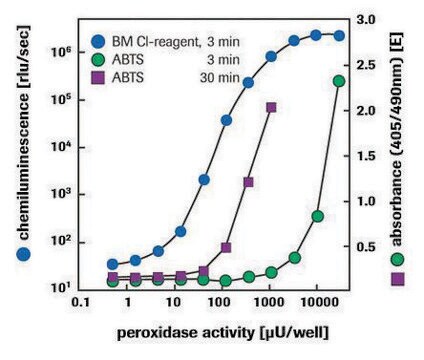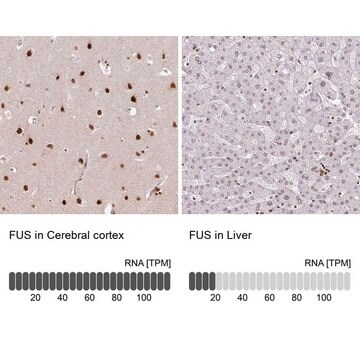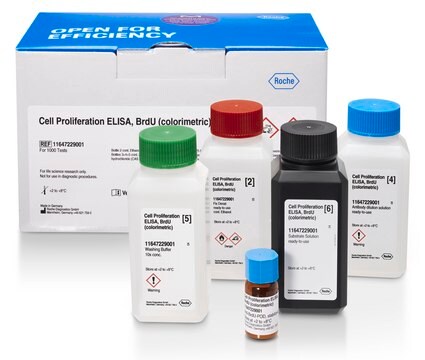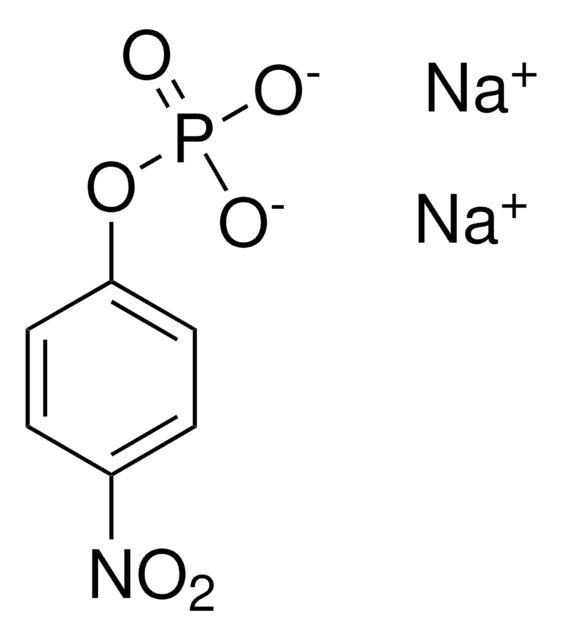11759779001
Roche
BM Chemiluminescence ELISA Substrate (AP)
Sign Into View Organizational & Contract Pricing
All Photos(1)
About This Item
UNSPSC Code:
12352204
Recommended Products
usage
sufficient for 1,000 tests (ELISA)
sufficient for 600 tests (SEAP)
packaging
pkg of 150 mL
manufacturer/tradename
Roche
shipped in
wet ice
storage temp.
2-8°C
Specificity
The AP assay system is designed for measuring alkaline phosphatase of various sources (e.g. intestine, placenta, milk, bacteria).
Features and Benefits
- Sensitive: Approximately 10fg intestinal alkaline phosphatase can be detected
- High dynamic measuring range: Linear range of more than five orders of magnitude
- Constant light emission: The assay produces a long-lasting light emission instead of a short peak kinetics
Components
1. Alkaline Phosphatase Substrate, CSPD
2. Enhancer, Emerald II
3. Assay Buffer
2. Enhancer, Emerald II
3. Assay Buffer
Principle
CSPD is dephosphorylated by alkaline phosphatase (AP). The resulting instable dioxetane anion decomposes and emits light at a maximum wavelength of 477nm. Chemiluminescence-enhancing reagents improve the quantum yield of the excited state by more than 500 fold.
Preparation Note
Working solution: Preparation of working solution
The substrate reagent is composed of AP-substrate (bottle 1), Enhancer (bottle 2) and Assay Buffer (bottle 3). Prepare substrate reagent freshly before use. The ratio of the components depends on the application. The substrate reagent is stable at least for one day at 2 to 8 °C.
The substrate reagent is composed of AP-substrate (bottle 1), Enhancer (bottle 2) and Assay Buffer (bottle 3). Prepare substrate reagent freshly before use. The ratio of the components depends on the application. The substrate reagent is stable at least for one day at 2 to 8 °C.
Other Notes
For life science research only. Not for use in diagnostic procedures.
Storage Class Code
12 - Non Combustible Liquids
WGK
WGK 1
Flash Point(F)
does not flash
Flash Point(C)
does not flash
Certificates of Analysis (COA)
Search for Certificates of Analysis (COA) by entering the products Lot/Batch Number. Lot and Batch Numbers can be found on a product’s label following the words ‘Lot’ or ‘Batch’.
Already Own This Product?
Find documentation for the products that you have recently purchased in the Document Library.
Customers Also Viewed
JunBae Jee et al.
Journal of clinical microbiology, 42(12), 5664-5672 (2004-12-08)
We investigated the acquisition and prevalence of Chlamydophila sp. infection in calves. Specimens were collected at weekly intervals from birth to week 12 postpartum from 40 female Holstein calf-dam pairs in a dairy herd. Real-time PCR detected, quantified, and differentiated
Martijn J Wilmer et al.
Cell and tissue research, 339(2), 449-457 (2009-11-11)
Reabsorption of filtered solutes from the glomerular filtrate and excretion of waste products and xenobiotics are the main functions of the renal proximal tubular (PT) epithelium. A human PT cell line expressing a range of functional transporters would help to
Our team of scientists has experience in all areas of research including Life Science, Material Science, Chemical Synthesis, Chromatography, Analytical and many others.
Contact Technical Service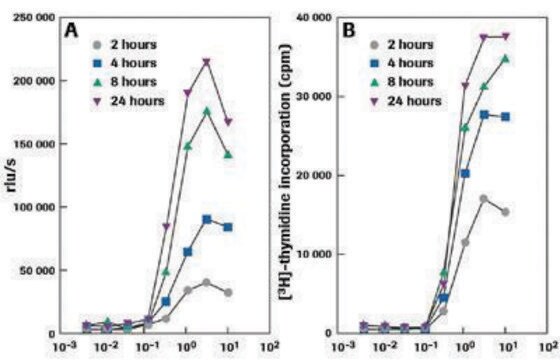

![CDP-Star® Disodium 2-chloro-5-(4-methoxyspiro {1,2-dioxetane-3,2′-(5′-chloro)tricyclo[3.3.1.13,7 ]decan}-4-yl)-1-phenyl phosphate](/deepweb/assets/sigmaaldrich/product/structures/224/846/d08963f5-c8ba-42e6-b4f7-9ee7fd76d809/640/d08963f5-c8ba-42e6-b4f7-9ee7fd76d809.png)

